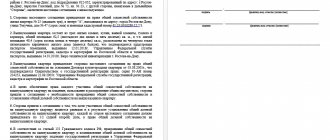In practice, there are often cases when an apartment belongs to several owners. Such co-ownership, especially between strangers, often leads to conflicts. A forced purchase of a share from one or more owners may help resolve the issue. Read more in this article about the cases in which it is allowed (insignificant share, impossibility of allocating a share in kind, lack of significant interest in the use of property) and how to implement a forced redemption of a share.
Permissibility of forced redemption of shares
“Fragmentation” of rights to living space can arise for various reasons:
- the property was inherited by several persons, - the property was purchased by spouses during marriage, - the apartment belongs to both adults and children, since it was bought using maternal capital, - black realtors bought a small share in the living space in order to make it unbearable for others to stay in the apartment and buy it out their shares for next to nothing, etc.
In all these cases, if there is a conflict, the use of common property becomes difficult and sometimes impossible. One way to solve the problem is a forced buyout of the share.
The question is whether it is possible and under what conditions. If the theoretical justification for the admissibility of forced redemption of a share does not interest you, then we recommend that you immediately proceed to the second section of the article: Subject of proof in cases of forced redemption of a share.
For those who want to better understand the nature of the legal institution under discussion, we suggest that you familiarize yourself with the key article from the Civil Code of the Russian Federation. We will be most interested in part four.
Article 252. Division of property in shared ownership and allocation of a share from it
1. Property in shared ownership may be divided between its participants by agreement between them.
2. A participant in shared ownership has the right to demand the allocation of his share from the common property.
3. If the participants in shared ownership fail to reach an agreement on the method and conditions for the division of common property or the allocation of the share of one of them, the participant in shared ownership has the right to legally demand the allocation in kind of his share from the common property.
If the allocation of a share in kind is not permitted by law or is impossible without disproportionate damage to property in common ownership, the allocated owner has the right to have the value of his share paid to him by other participants in shared ownership.
4. The disproportion between the property allocated in kind to a participant in shared ownership on the basis of this article and his share in the right of ownership shall be eliminated by payment of the appropriate amount of money or other compensation.
Payment of compensation to a participant in shared ownership by the remaining owners instead of allocating his share in kind is permitted with his consent. In cases where the owner’s share is insignificant, cannot be realistically allocated and he does not have a significant interest in the use of the common property, the court may, even in the absence of the consent of this owner, oblige the remaining participants in the shared ownership to pay him compensation.
5. Upon receipt of compensation in accordance with this article, the owner loses the right to a share in the common property.
Returning to the question of the possibility of a forced buyout of a share, the answer, in our opinion, would be more correct to give in two dimensions:
— from the point of view of normative interpretation, — taking into account judicial practice.
1.1. Regulatory regulation of forced buyout of shares
In Part 4 of Art. 252 of the Civil Code of the Russian Federation directly provides for the conditions for the forced redemption of a share, however, when interpreting, it is necessary to take into account not only a specific proposal, but also the entire rule, and in this case, the entire article, which contains several rules.
Let us outline the contents of the article schematically.
From the figure it becomes obvious that the question of compensation arises only after the owner files a claim for the allocation of his share in kind. In this case, the repurchase of the share is used as a response to the plaintiff’s demand.
Another reading of the commented norm can be seen in the appeal ruling of the Supreme Court of the Republic of Sakha (Yakutia) dated January 29, 2018 in case No. 33-311/2018: application of the provisions of paragraph. 2 clause 4 art. 252 of the Civil Code of the Russian Federation is possible only in the case where a demand for the restoration of violated rights and legitimate interests by buying out an insignificant share of a co-owner that is not subject to allocation in kind, in the absence of his consent and significant interest in the use of common property, was stated by other co-owners who have a large share in shared ownership .
Schematically, in our understanding, it looks like this:
There is also a third position: by establishing in the said norm the possibility of forced payment to a participant in shared ownership of monetary compensation for his share, and, consequently, the loss of his right to a share in the common property, the legislator proceeded from the exclusivity of such cases, their admissibility only under specific circumstances and only to the extent necessary to restore the violated rights and legitimate interests of other participants in shared ownership, and therefore, extended the effect of this rule to both the claims of the separated owner and the demands of the remaining participants in shared ownership (appeal ruling of the Ulyanovsk Regional Court dated 10/17/2017 in case No. 33-4435/2017).
In our opinion, problems in interpretation are associated with the not very successful legal and technical design of the article. Paragraph two, part 4, art. 252 of the Civil Code of the Russian Federation, indeed, can be read in different ways.
The key word in the second sentence of the paragraph is, perhaps, the word “oblige.” On the one hand, if we were talking about a claim for forced redemption of a share, then it would be more correct to talk about satisfying the demand rather than imposing an obligation. On the other hand, satisfaction of the claim may consist precisely in the plaintiff’s obligation to pay appropriate compensation, which entails the termination of ownership of the defendant’s share.
If we consider the option that compensation can only take place in the event of a claim by the distinguished owner, then the development of events turns out to be somewhat absurd. Why would a person file a claim for compulsory redemption of a share, for example, in an apartment, other than with the intention of receiving compensation? After all, it is obvious that it is impossible to receive your share in kind (if this is not obvious, do not worry, there will be an explanation below). Then, in what case might a situation arise where it is necessary to impose an obligation to pay compensation in the absence of the plaintiff’s consent? We cannot imagine such a development of the situation.
To summarize the legislative regulation of the issue of forced buyout of a share, let us say that, in our opinion, the initiative can come from both parties. The law does not say otherwise. Let the possibility of implementing this measure remain at the discretion of the court, which will make a decision based on the entire body of evidence and taking into account specific circumstances.
1.2. Judicial practice on forced buyout of shares
Let's start, perhaps, with explanations from higher courts about the admissibility of forced buyout of a share, and then we'll talk about what trends are observed in lower courts.
Of significant interest is the rather old resolution of the Plenum of the Supreme Court of the Russian Federation dated June 10, 1980 No. 4 “On some issues of the practice of consideration by courts of disputes arising between participants in common ownership of a residential building”:
If there is a real possibility of allocating a share in kind, monetary compensation for part of the house should not be recovered in favor of both the allotted and the remaining co-owners if they object to receiving it, since the right to dispose of property belongs only to the owner himself
and he can be deprived of this right only in cases and on the grounds specified in the law.
If it is impossible to allocate in kind, monetary compensation for a share in the common ownership of the house is determined by agreement of the parties. If an agreement is not reached, then, at the claim of the separating owner, the amount of compensation is established by the court based on the actual value of the house at the time of resolution of the dispute.
On the one hand, the position of the RF Armed Forces boils down to the fact that depriving a person of property rights at the claim of another person is unlawful. Accordingly, it is impossible to demand a forced redemption of the share. On the other hand, the clarification contains a clause regarding exceptions provided for by law. And this is all contained in the same article. 252 of the Civil Code of the Russian Federation.
Another act that should be paid attention to is the resolution of the Plenum of the Supreme Court of the Russian Federation No. 6, the Plenum of the Supreme Arbitration Court of the Russian Federation No. 8 of July 1, 1996 “On some issues related to the application of part one of the Civil Code of the Russian Federation.”
The last paragraph of paragraph 36 states that in some cases, taking into account the specific circumstances of the case, the court may transfer an indivisible thing into the ownership of one of the participants in shared ownership who has a significant interest in its use, regardless of the size of the shares of the other participants in the common property with compensation to the latter for the cost of their shares.
This clarification allows for an approach according to which an interested owner can file a claim for forced redemption of a share. It was confirmed by the RF Armed Forces when considering one of the supervisory complaints:
The arguments of the supervisory complaint that the application of the provisions contained in paragraph 2 of paragraph 4 of Article 252 of the Civil Code of the Russian Federation is permissible only in relation to a participant demanding the allocation of his share from the common property are based on an incorrect interpretation of the rules of substantive law. By establishing in this norm the possibility of forced payment to a participant in shared ownership of monetary compensation for his share, and therefore the loss of his right to a share in the common property, the legislator proceeded from the exclusivity of such cases, their admissibility only under specific circumstances and only to the extent that this is necessary to restore the violated rights and legitimate interests of other participants in shared ownership, and therefore extended the effect of this norm both to the claims of the separated owner and to the demands of the remaining participants in shared ownership (Decision of the Supreme Court of the Russian Federation dated October 24, 2006 No. 56-B06- 17) .
The Constitutional Court of the Russian Federation, in turn, on the contrary, firmly adheres to the position that forced redemption of a minority share on the initiative of other owners is not allowed.
So, in paragraph 2.1. The ruling of the Constitutional Court of the Russian Federation dated 02/07/2008 No. 242-О-О “On the refusal to accept for consideration the complaint of citizens Anatoly Anatolyevich Sangadzhiev and Oleg Anatolyevich Sidorov for violation of their constitutional rights by the second paragraph of paragraph 4 of Article 252 of the Civil Code of the Russian Federation” states that the law does not provide for the possibility of one participant in the common property filing a claim to deprive another participant of the right to a share with payment of compensation to him, even if this participant does not have a significant interest in the use of the common property and his share is insignificant.
This position was supported by the Constitutional Court of the Russian Federation in subsequent acts: definitions of October 19, 2010 No. 1322-О-О, of May 11, 2012 No. 722-О, of July 16, 2013 No. 1086-О, of May 29, 2014 No. 1148 -O, dated February 27, 2021 No. 400-O, etc.
It should be noted that such a conclusion does not find wide support in courts of general jurisdiction. When analyzing several hundred cases, only a few judicial acts were identified, which provided reference to the relevant explanations (see, for example: the appeal ruling of the Primorsky Regional Court dated May 15, 2017 in case No. 33-4358/2017; the ruling of the Primorsky Regional Court dated April 13. 2015 in case No. 33-2972, etc.). Moreover, sometimes the court, even referring to the rulings of the Constitutional Court of the Russian Federation, still believes that in exceptional cases a different interpretation of the law is possible (appeal ruling of the Nizhny Novgorod Regional Court dated May 15, 2018 in case No. 33-5634/2018).
Summarizing the judicial practice of the courts of first and appellate instances, we will highlight a number of trends and approaches regarding the admissibility of forced buyout of a share.
(1) The region in which the case is being considered plays an important role. For example, in the Far Eastern and Central Federal Districts, the percentage of satisfied claims for forced buyout of shares is quite high. The opposite situation is observed in the Volga Federal District. Perhaps this is partly due to the fact that the objects of division in the latter are often land plots and houses, the division of which can be carried out in kind.
In general, you need to understand that a lot always depends on the individual judge. After all, even within the same court there can be absolutely opposite positions. Thus, in one case, the Moscow City Court insisted that Part 4 of Art. 252 of the Civil Code of the Russian Federation can only be applied if a claim for forced redemption of a share is filed by a minority owner (appeal ruling of the Moscow City Court dated June 18, 2018 in case No. 33-20145/2018), in another case the opposite was substantiated in great detail (appeal ruling of the Moscow City Court dated April 20 .2018 in case No. 33-16770/2018; see also: appeal ruling of the Moscow City Court dated June 18, 2018 in case No. 33-20145/2018).
But still, when initiating processes for the forced buyout of shares in “problem” regions, one should be especially careful in preparing a position on the case and collecting evidence.
(2) The chances of forced redemption of a share in a one-room apartment are higher (decision of the Primorsky Regional Court dated June 23, 2015 in case No. 33-5183/2015). Although, as usual, there are some exceptions. Thus, the court refused to recognize an insignificant ¼ share in a one-room apartment, despite the fact that the defendant did not live in it and did not pay utilities (appeal ruling of the Samara Regional Court dated 02/08/2018 No. 33-1381/2018). But it should be recognized that from the reasoning part of the judicial act it is not at all clear why the court came to such a decision.
(3) The percentage of satisfied claims for forced purchase of a share is quite high, provided that the defendant does not provide evidence that he has a significant interest in the use of this living space. Particular weight is given to evidence confirming the absence of other real estate and the presence of minor children (ruling of the Primorsky Regional Court dated August 12, 2015 in case No. 33-6881/2015; ruling of the Primorsky Regional Court dated July 1, 2015 in case No. 33-5454/2015; appeal ruling Moscow City Court dated July 6, 2017 in case No. 33-26308/2017).
But, again, these are only generalizations and do not mean that it is impossible to achieve a different outcome. So, for example, the co-plaintiffs managed to convince the court of the admissibility of the forced purchase of 1/25 of the share belonging to the minor Yu.M.F. (appeal ruling of the Supreme Court of the Republic of Mordovia dated 07/04/2018 in case No. 33-1209/2018). The decision was based on the circumstances that the child is not registered and does not live in the disputed apartment, and the share is so small that it cannot be of interest for the use of common property.
The judicial acts in case No. 33-30219/2017, where a victory was won over black realtors (the claim for forced buyout of the share was satisfied), deserve special support. The courts sided with the plaintiff, who proved that the defendant, although registered in the disputed apartment with minor children, is a professional buyer of shares, since he owns shares in 10 more apartments. Upholding the decision of the Chertanovsky Court, the Moscow City Court indicated: “the judicial panel comes to the conclusion that on the part of the defendant, in violation of the provisions of Art. 10 of the Civil Code of the Russian Federation constitutes an abuse of right, because, knowing about the presence of other co-owners in the apartment, the unsuitability of the apartment for the joint residence of different families, he knowingly acted in bad faith” (appeal ruling of the Moscow City Court dated 08/16/2017 in case No. 33-30219/ 2017). Using this case as an example, I would like to note that you should never give up ahead of time and give up. Even if at first it seems that the other side's position is very strong. See also: appeal ruling of the Moscow City Court dated June 16, 2017 in case No. 33-22823/2017; appeal ruling of the Moscow City Court dated 06/06/2017 in case No. 33-19030/2017.
Here is another encouraging exception to the trend outlined above: the appeal overturned the decision of the trial court to refuse to satisfy the claim for compulsory redemption of the share, which was based on the argument that the defendant did not have any other living space. The fact is that the conclusion was “made without taking into account the actions he had previously taken to dispose of other residential premises” (appeal ruling of the Moscow City Court dated July 24, 2017 in case No. 33-28769/2017). In this case, there was cunning on the part of the defendant. Knowing about the upcoming trial, he got rid of the rights to other real estate in order to have a strong case in his favor. However, the plaintiff’s representative managed to open and demonstrate to the court the entire chain and, as a result, won the case.
In general, it should be noted that quite a lot of claims for forced buyout of shares are filed and their satisfaction is not uncommon. Everything depends on the actual circumstances and the collected evidence. Before starting the process, we recommend assessing the prospects within your specific situation. This often saves trustees from unnecessary expenses on obviously losing cases. The cost of consultation on the issue of forced buyout of a share in our Legal Laboratory is 5,000 – 10,000 rubles.
Termination of the contract: grounds, procedure
A contract can be terminated in court for several reasons:
- The tenant violated the terms of payment for the rent: six months for long rental periods, for short terms - failure to pay the payment more than twice upon the expiration of the payment period.
- The tenant or the persons for whom he is responsible have damaged the landlord's property (the court may grant a period of one year for all damage to be eliminated, or the contract is terminated).
- The tenant refuses to pay utility bills.
- The tenant is behaving immorally.
- The party does not comply with the conditions specified in the contract.
- The premises are unsuitable for living.
- The tenant, or the persons for whom he is responsible, use the room for other purposes and violate the rights of other residents to use the premises.
To terminate the contract you need to:
- Notify the tenant of the termination of the contract three months in writing, unless otherwise agreed upon separately.
- The contract is terminated by mutual consent of the parties if no disputes or other conflicts arise.
- Otherwise, we go to court.
The lease is most often issued for an entire apartment. We have prepared for you some useful materials about this procedure:
- Social, commercial, official and gratuitous hiring.
- The procedure for registering a lease.
- How to conclude a lease agreement for specialized housing?
- Procedure for short-term and long-term rental.
- Possible problems with tenants.
You should be especially careful in the process of drawing up the text of the contract and think through all the terms of employment. Based on its text, it will be possible to resolve all difficulties and conflicts if they arise, so it is better to foresee all troubles in advance.
Subject of proof in cases of forced redemption of shares
In Part 4 of Art. 252 of the Civil Code of the Russian Federation clearly states what must be proven when filing a claim for forced redemption of a share:
- insignificance of the share, - impossibility of its real allocation, - lack of significant interest in the use of common property.
In judicial acts you can find a more detailed description of the subject of proof. Thus, the Presidium of the Supreme Court of the Republic of Bashkortostan in one of the cases indicated the following: the legally significant and subject to proof circumstance was the clarification of the following questions: can the owner’s share in the property be allocated in kind, can the property be used by all owners for its intended purpose (for living). ) without violating the rights of the owner who has a large share in the property right; is it possible to provide the defendants with isolated residential premises for use, commensurate with their shares in the property right, do the defendants have a significant interest in the use of common property, do they need to use the common property, and also do they have the opportunity to pay monetary compensation to another co-owner.
2.1. Insignificance of the share
This criterion does not have a predetermined indicator, but is determined in each case individually. The significance of the share depends on the characteristics of the property. For example, 1/5 in a one-room apartment with an area of 36 sq.m., with a high degree of probability, will be considered insignificant. However, the same share in a 3-room apartment can already amount to an entire room, which will make its full use for the owner and reduce the chances of satisfying a claim for forced redemption of the share to zero
For example, K.’s claims were satisfied on the basis that “... that the disputed apartment is one-room and small in size, cannot be used for the residence of both co-owners without violating the rights of the plaintiff, who has a large share in the ownership of this apartment, while the possibility there is no provision for the defendant to use isolated residential premises commensurate with his share in the ownership of the apartment, and he does not have a significant interest in the use of common property...” (appeal ruling of the Primorsky Regional Court dated May 15, 2017 in case No. 33-4358/2017 ).
In another case, the court quite rightly refused to satisfy the request for the forced purchase of ½ share in an apartment acquired during the marriage (decision of the Primorsky Regional Court dated November 5, 2015 in case No. 33-10014/2015). Obviously, half cannot be an insignificant share, since, at a minimum, it is not less than the remaining part. Unfortunately, such a claim, despite its illiteracy, is not unique (appeal ruling of the Penza Regional Court dated March 20, 2018 No. 33-912/2018).
Taking this into account, if you plan to defend your interests in court on your own, we still recommend contacting lawyers for advice and assistance in preparing documents. The cost of filing a claim for forced redemption of a share in the Maya Sablina Law Laboratory is 20,000 - 30,000 rubles.
The general rule for an insignificant share can be formulated as follows: if the share in the right to living space at least approximately corresponds to any of the existing rooms in the apartment or it can be created, then such a share will not be considered insignificant.
Thus, one of the courts of the Saratov region refused to satisfy the claim for the forced purchase of the share of S., who owned 1/3 of the ownership rights to an apartment with an area of 58.9 meters, since it had three rooms (17.6, 13.6 and 7.6 sq.m.), any of which can be used by the defendant for its intended purpose in accordance with its share (appeal ruling of the Saratov Regional Court dated 03/07/2018 No. 33-1463/2018).
Using the above example, it is convenient to consider the “approximate correspondence” rule. It is not at all necessary that the footage of the room coincides with the share of ownership to within a tenth of a meter. The deviation can be up to 5 meters, both up and down. But you always need to start from specific factual circumstances. For example, if the share in the living space is 2-3 square meters, then this will not be a basis for providing the owner with a 7-8 meter room. But 12 and 17 sq.m. can already be considered comparable. The fact is that 2-3 sq.m. absolutely useless from the point of view of using the premises for their intended purpose - for living. After all, even a bed wouldn’t fit on such a piece of land, and it would be unfair to infringe on the rights of the majority owners. Twelve meters is a significant area in itself, and it would be unfair to refuse to provide a separate room due to the existing layout.
You should also pay attention to another important clarification that was made in the formulated rule: if the share in the right to living space at least approximately corresponds to any of the existing rooms in the apartment or it can be created , then such a share will not be considered insignificant. If, according to the conclusion of an expert organization, with the existing layout it is possible to isolate an additional room approximately comparable to the disputed share, then the latter cannot be considered insignificant.
2.2. Impossibility of allocating a share in kind
To simplify the explanation, let's make a comparison with a plot of land. Imagine that there is a piece of land with an area of, for example, 30 acres. The plot has two owners: the brother owns 4/5, the sister – 1/5 of the land plot. Relatives have a conflict, and they can no longer live in the same territory. Well, it’s enough to simply separate 6 acres with a fence and the sister can use them at her own discretion: plant a vegetable garden, build a house, a bathhouse, etc. Yes, in this case, a share in kind will need to be allocated at the border of the plot next to the roadway so that the sister can freely enter and leave the plot without affecting the rights of her brother or neighbors.
In an apartment, it is impossible to allocate a share in kind without commensurate damage to the entire property. After all, even if the share corresponds to one of the existing rooms in the living space, then how to ensure the division of corridors, kitchens, bathrooms and other common areas? In a detached house, you can still achieve your goal by, for example, reconstructing the building, but in the conditions of typical urban housing this is an impossible task.
With this in mind, it is necessary to understand that, other things being equal, the forced purchase of a share in an apartment is much more realistic than the forced purchase of a share in a house or land plot. Although if the latter has a minimum size taking into account land legislation, then allocating a share in kind also becomes impossible.
2.3. Lack of significant interest in the use of common property
In paragraph 36 of the resolution of the Plenum of the Supreme Court of the Russian Federation No. 6, the Plenum of the Supreme Arbitration Court of the Russian Federation No. 8 dated 07/01/1996 “On some issues related to the application of part one of the Civil Code of the Russian Federation” it is explained that when deciding the issue of the absence of a significant interest in the use of common property In particular, the need for the use of this property is assessed due to age, health status, professional activity, the presence of children, other family members, including disabled people, etc.
Often in the reasoning part of judicial acts in cases of forced redemption of a share, one can find an indication that the lack of a significant interest of the defendant in the use of common property has not been proven (appeal ruling of the Penza Regional Court dated January 30, 2018 No. 33-314/2018). Taking this into account, it should be concluded that it is not enough to simply refer to the defendant’s non-residence in the apartment. Relevant evidence must be provided. For example, data confirming the registration of a minority shareholder at a different address, his ownership of another living space, work in another region, income allowing him to purchase other real estate; previously sent proposals to buy out his share, etc.
It should be noted that in practice there is also another approach, according to which the defendant himself must prove that he has a significant interest (appeal ruling of the Moscow City Court dated March 14, 2018 in case No. 33-10810/2018).
There are arguments in favor of both positions. On the one hand, confirming negative facts (in our case, lack of interest) is one of the most difficult tasks in the process. On the other hand, there is a direct requirement of the law that each party is obliged to prove the circumstances to which it refers (Article 56 of the Code of Civil Procedure of the Russian Federation). Since, using imagination, it is still possible to collect certain evidence, we recommend doing so. We are ready to both help prepare for the process as part of a consultation, and fully represent your interests in the forced purchase of a share through the court. For more information on assistance in resolving housing issues, see here.
Please note that the courts also take into account the duration of ownership of real estate (appeal ruling of the Moscow City Court dated May 24, 2018 in case No. 33-22124/2018). If the parties have only recently acquired ownership of an object, it is impossible to determine with certainty whether any of them has a significant interest in its use or not. The measure provided for in Part 4 of Art. 252 of the Civil Code of the Russian Federation, should be applied in exceptional cases and in the presence of sufficient grounds.
Another important point: the plaintiff demanding the forced redemption of the defendant’s share must deposit the amount of the expected compensation into the deposit account of the court or notary, as this will indicate the real possibility of paying the amount of money due to the minority shareholder. Otherwise, the court may come to the conclusion that the plaintiff does not have the opportunity to make a calculation, which will lead to a refusal to satisfy the claim for forced redemption of the share (appeal ruling of the Moscow City Court dated November 2, 2017 in case No. 33-45187/2017, appeal ruling of the Moscow City Court court dated August 28, 2017 in case No. 33-34200/2017).
There are many nuances in cases of forced buyout of shares. We sincerely discourage participation in these processes without professional representation. But if for some reason contacting a lawyer is difficult or undesirable for you, then we suggest watching a video about the forced buyout of a share on our YouTube channel:
How the value of a minor interest is determined and paid
Of course, the parties have a dispute regarding the value of such a share, and only a professional appraiser can resolve this issue.
An examination of the value of property can be ordered by the court at the request of the parties, however, such an assessment can be carried out by the plaintiff before filing a claim. The appraiser's conclusion will be accepted by the court if the defendant does not challenge this assessment and does not file a petition to order a judicial assessment of the property.
When accepting a claim for his proceedings, the judge takes measures to secure the claim and issues an appropriate ruling, according to which the plaintiff must transfer to the deposit account of the Office of the Judicial Department under the Armed Forces of the Russian Federation an amount of money equal to the market value of the purchased share of the property. The receipt for the transfer of funds to the deposit of the Office of the Judicial Department is attached to the case.
Since the plaintiff will not be able to independently determine the real value of the share, it is recommended to conduct a pre-trial assessment of the property.
In any case, if the claims made by the plaintiff are satisfied, all costs of the assessment (both pre-trial and judicial, including if both assessments were carried out) will fall on the shoulders of the defendant.
In crowded but not mad…
Yes, of course, you can be guided by this principle and tolerate unwanted proximity. But still, if you are ready to fight for your rights and circumstances allow you to do so, go into battle!
If you have become a victim of unscrupulous plaintiffs, do not lose heart either. There is no pre-established truth in such disputes. It all depends on how the line of defense is built. We are always ready to give an objective assessment of your situation and help achieve justice.
The article was prepared taking into account the edition of regulatory legal acts in force as of October 21, 2018. Author of the article: Maya Sablina, Director of the Law Laboratory
Estimated cost of services to support cases of forced buyout of shares in the Maya Sablina Law Laboratory:
| № | Name of service | Cost, rub.) |
| 1. | Consultation on forced buyout of shares | 5 000 – 10 000 |
| 2. | Drawing up a claim for forced redemption of a share | 20 000 – 30 000 |
| 3. | Forced redemption of a share through the court | 90 000 – 120 000 |
| 4. | Representation on forced purchase of shares at the appeal stage | 40 000 – 50 000 |
Don't be afraid to defend your rights and do it with us!
Documentation
To complete the transaction, you will need to prepare the following package of documents:
- documents confirming ownership of the property: contracts of purchase and sale, donation or exchange, certificates of inheritance;
- papers evidencing state registration of property rights (extract from the Unified State Register, certificate of registration of property rights) and the absence of encumbrances that impede the completion of the transaction;
- documents prepared by the Bureau of Technical Inventory, containing a description and characteristics of the object: cadastral plan, floor plan of the building. an explication with drawings and an indication of the area of individual premises;
- an extract from the house register, which indicates all citizens registered at the time of the transaction.
It will also be necessary to submit the consent of the seller’s spouse to the alienation of shared property, certified by a notary, indicating its characteristics.










